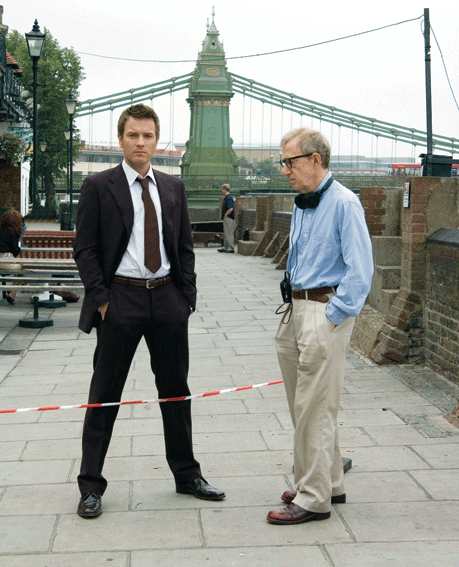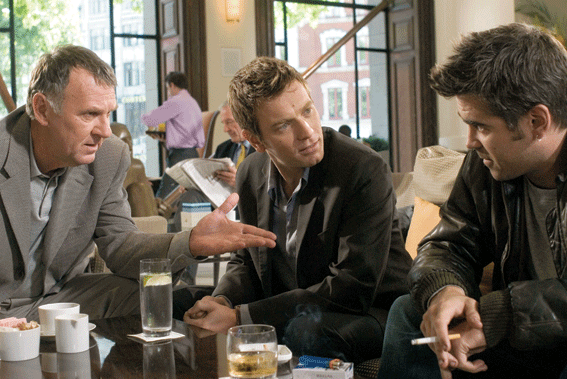
![]() Cinema
Cinema
Woody Allen
A New Yorker Abroad Returns Home
Writer/director Woody Allen returns to his darker impulses in his new film, “Cassandra’s Dream,” a London-based crime thriller that explores what a couple of poor brothers will do to get rich, or at least to get by, and what their wealthy uncle will do to keep from becoming poor, or worse.
By: Ryan Stewart *
Photo by: Keith Hamshere.
Comparisons will inevitably be made to “Match Point” (2005), Allen’s critically acclaimed drama about the whims of fate and luck, but this time the emphasis is less on the tensions between men and women than on how far family loyalties can be stretched before they snap.
Premiere spoke to the filmmaker in New York, where he’s currently in the mixing room working on his next movie, a romantic comedy starring Scarlett Johansson and Javier Bardem called “Vicky Cristina Barcelona.”
QUESTION: So what are you working on today?
WOODY ALLEN: Today I’m doing a certain amount of interviews for the opening of the film, because I’m here and available and I want to be cooperative with the people who are distributing it.
Q: Are you finished mixing and editing “Vicky Cristina Barcelona?”
ALLEN: I’m done with the editing of it, but I’m not done with the mixing. We’re actually in the midst of mixing now, and color correcting, but the actual cutting of the film is done.
Q: I read somewhere recently that Steven Spielberg always does five passes on his pictures. How many cuts do you do?
ALLEN: I think we do one cut, and then you finesse it. I don’t recut the whole picture. I may change a scene, shorten a scene, take out a scene and then put it back in later, but basically the first cut of the film is the film.
Q: So you’re almost to the point where you’ll never see the film again, since you prefer not to revisit your films.
ALLEN: I will have to see it when I color-correct it. I won’t be seeing it with sound, but I will check the mix one time and, once the mix is finished, that will probably be the last time that I hear the picture. And then I’ll color-correct it, and then I’m finished with it. I’ll have seen it a hundred times.
Q: I saw “Cassandra’s Dream” recently, and I found Colin Farrell’s character interesting. He’s unlike many of the characters in your murder dramas.
ALLEN: Well, I wanted to delineate three characters.
I wanted one person who had no problem compromising himself ... and another who couldn’t handle it because, in the end, he just had too much conscience. Something just struck him as wrong and he couldn’t take it. He couldn’t be sure that there was not some kind of moral order to the universe, and thought that he had transgressed it in some way and it had to be set right.
And then a brother who was able to handle a moral compromise and an uncle who is completely amoral and can have these guys take care of his problem and, at the end, just march off without any problem ... So I wanted to give a contrast between those three.
Q: Do you ever look at a dark drama like this one, while you’re making it, and decide that it needs some humor to keep it from being oppressively bleak?
ALLEN: Once in a while.
There are a few laughs in this picture. There are a few things that are funny, just like in “Match Point” when Jonathan Rhys Meyers is trying to put the rifle together just before he kills the woman. The parts kept dropping and he couldn’t assemble it when the time came, and then finally he did.
Same thing here: They want to kill the guy, but there’s constantly an excuse. Colin comes up with an excuse – “Let him talk to his mother first, and then we’ll kill him.”
There were things that were lighter, that were for slight relief from the relentless tragedy that was unfolding. Meeting the guy at a party and coming face to face with him, you know, had a lighter quality. I’m not going to do jokes in the thing, but there are moments that are lighter, ironical, amusing, in the hopes of giving it some slight pace that way.
Q: I’m sure you have as much control over your films now as you ever did, but I wonder if these days you’re coming under more pressure to cater to things such as DVD features.
ALLEN: No, I’m not under any pressure whatsoever. Nobody ever even suggests it. I make the film and then I put it out, and they put it on DVD.
Invariably they ask me “Do you have any outtakes? Do you have anything we can throw on this thing?” But I almost never do.
And I’m not the kind of person who wants to comment on my films as you’re watching them, so I’ve had very sparse DVDs.
Q: What about stuff that your fans would be interested in, such as the lost scenes from the “Anhedonia” cut of “Annie Hall” (1977), the one with you playing basketball against the Knicks and other scenes?
ALLEN: All that stuff is probably nonexistent. I probably destroyed that 20 years ago.
Q: Really? It’s not moldering in some warehouse?
ALLEN: Not that stuff. We keep stuff from the last current couple of films and, as they become three and four down the line, we throw the stuff away.
Q: Does it matter to you if your movies are seen on a big screen, versus a television screen or something smaller?
ALLEN: Yes. I would rather they’re seen on the big screen. That’s the whole idea of movies.
Now, eventually I guess you’ll be sitting in your media room at home and you’ll have high definition and a 1.85 screen that’s 7-feet-by-10-feet or something, and there won’t be much difference, but the truth is that it’s made to be on a movie screen, a larger-than-life screen, with audiences filing in and buzzing about it and coming out and giving their opinions. It’s a social experience and a communal experience.
So I don’t love that they’re seen for the first time on DVD, but there’s nothing you can do, because the culture has moved that way.
Q: Now you’re back in Manhattan, gearing up to start shooting in the spring after four films abroad. Does absence make the heart grow fonder?
ALLEN: It makes my heart grow fonder.
I did the first film, “Match Point,” (in London) because they put the money up. I had finished it for New York, the script, and I was getting ready to set it up in New York and they came along and said, “We’ll give you all the money you need to make it in London, make it here.”
I went there trepidatiously, but had such a nice experience because the weather was so good, the skies so gray and good for camerawork, that I went back the next summer and did a little picture (“Scoop”) with Scarlett (Johansson), just for the fun of the two of us working together, a trivial little picture that we did Then I went back again and did “Cassandra’s Dream” because I was enjoying it and they were financing it.
Then the people in Barcelona said that, if I would come there and make a film, they would finance it. So I went there and did this film this past summer.
Q: So it’s all very practical.
ALLEN: It’s very practical, yes. Now I’m going to start shooting in New York in about eight weeks or so, or six weeks. But after that it would really depend on what I set up.
People have spoken to me about financing movies in Paris and Rome, so I could conceivably do a film there or, if I was able to raise the money easily enough, my guess is that I’d probably do it in New York.
Q: By the way, what are you and Scarlett doing for that anthology film, “I Love New York?” The New York Post said that you’re each directing one of the shorts?
ALLEN: That was a total, total fabrication ... I mean, about me. I have no idea if or what she is doing for it. I’ve heard nothing. I am in no way connected with it, nor have I ever been.
Q: Is Scarlett sort of your student?
ALLEN: She’s just a very, very talented girl. She’s a very beautiful, very gifted girl with a big range. She can play drama, she can play comedy, she’s in this romantic film I did over the summer and she’s wonderful.
She’s a pleasure to work with. If there’s a part for her in my script, I always wind up calling her because, you know, I know her and I’ve gotten friendly with her and she’s very easy to work with and she always delivers. So, if the part is good for her, I’d call her first rather than go to some stranger.
Q: How often are you getting out to the movies these days?
ALLEN: Well, I have a screening room where I do my editing, so I usually screen at my screening room. My assistant will call up and borrow a film on the weekend.
I usually, just like every other person in America, habitually I’ll go on Saturday night. On Saturday night I’ll generally screen a film for myself and my friends at my screening room.
Q: You don’t enjoy the atmosphere of a public theater?
ALLEN: I do, yeah, but I’ve gotten lazy over the years, and it’s right near my house and I can just go over there.
I do see it on a full screen in an actual theater -- it’s a projection theater and I see it big, on the screen with good sound and all of that -- I’m not watching it on video. It’s just a little more convenient for me.
But once in a while I’ll drop in. I’ll take a walk in the daytime with my wife, and we’ll just drop in on a movie, because it’s easy to go in the daytime. There aren’t many people and, you know, we’ll sit in the movie house.
It’s still pleasurable for me.
* Ryan Stewart is a contributing writer for Premiere.com.